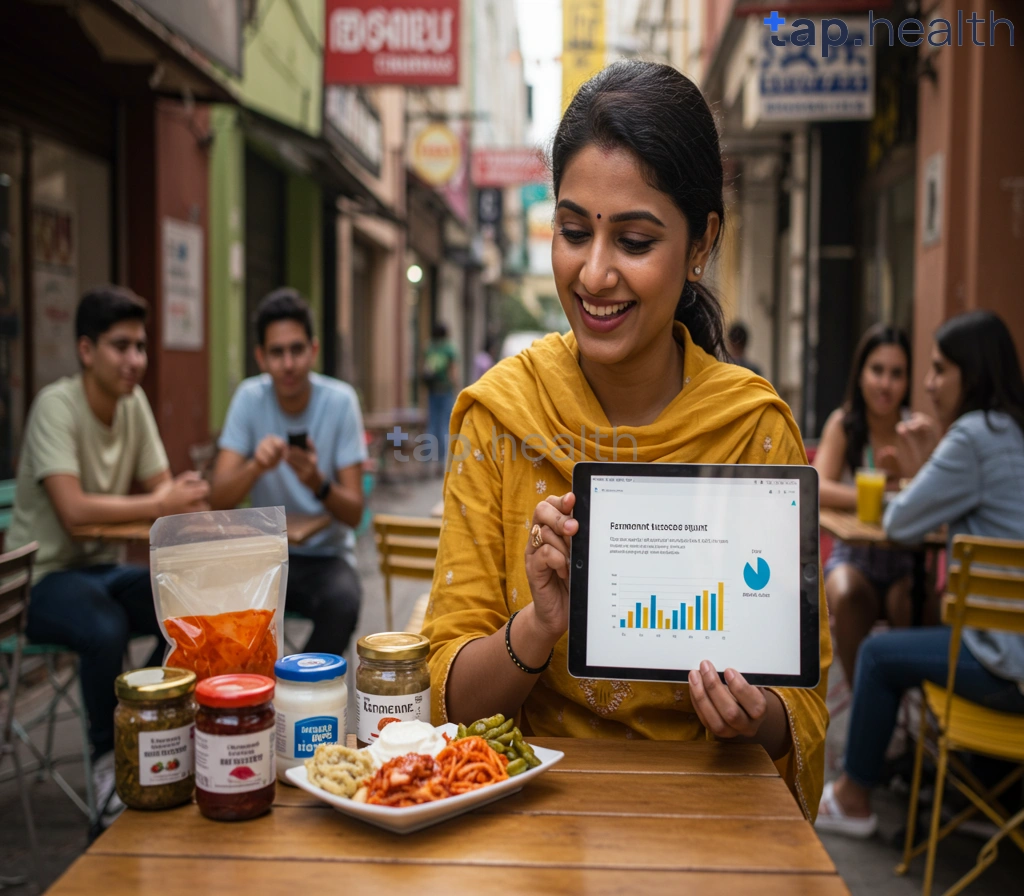Table of Contents
- Can Fermented Foods Manage Blood Sugar?
- Fermented Foods & Diabetes: A Simple Guide
- Improve Blood Sugar Naturally with Fermented Foods
- Top Fermented Foods for Diabetes Management
- The Best Fermented Foods for Better Blood Sugar Control
- Frequently Asked Questions
- References
Managing blood sugar levels is a daily challenge for millions living with diabetes, and finding simple, effective strategies can make all the difference. This is where the often-overlooked world of fermented foods steps in! Have you considered the potential benefits of incorporating these powerhouse ingredients into your diet? In this quick guide, Diabetes & Fermented Foods: A Minute Guide to Better Blood Sugar, we’ll explore how fermented foods can positively impact your blood sugar control and overall well-being. Let’s dive in and uncover the surprising connection between these tasty treats and better diabetes management.
Can Fermented Foods Manage Blood Sugar?
The alarming statistic that daily consumption of sugary beverages raises diabetes risk by 26% highlights the urgent need for effective blood sugar management strategies, especially in regions like India and tropical countries where dietary habits often include high levels of sugar. Fortunately, incorporating fermented foods into your diet might offer a promising solution. These foods, integral to many traditional Indian and tropical cuisines, boast a unique ability to positively influence blood sugar levels.
How Fermented Foods Help
The magic lies in the beneficial bacteria present in fermented foods. These probiotics improve gut health, which plays a crucial role in regulating blood sugar. A healthy gut microbiome enhances insulin sensitivity, meaning your body can effectively utilize the sugar in your bloodstream. This is particularly important for individuals in India and other tropical regions, where both genetic predisposition and lifestyle factors can contribute to higher diabetes risks. Examples of readily available fermented foods include yogurt (dahi), kimchi, idli, dosa (South Indian fermented rice and lentil batters), and various types of pickles.
Practical Tips for Incorporation
Start by gradually incorporating a variety of fermented foods into your daily meals. A simple yogurt parfait for breakfast, a side of kimchi with lunch, or adding idli/dosa to your dinner routine are excellent starting points. Remember that fermented foods are not a cure for diabetes, but they can be a valuable tool in managing blood sugar levels alongside other lifestyle changes like regular exercise and a balanced diet.
Taking Control of Your Health
In India and across tropical nations, where diabetes prevalence is rising, adopting simple, accessible strategies like incorporating fermented foods into your diet can make a significant difference. Prioritize gut health for better blood sugar control. For a deeper dive into how fermented foods regulate blood glucose, check out this article: Discover How Fermented Foods Help Regulate Blood Glucose Levels. Consult a healthcare professional or registered dietitian to create a personalized plan that best suits your needs and dietary preferences. To learn more about the overall role of fermented foods in a healthy diet, see The Role of Fermented Foods in a Healthy Diet.
Fermented Foods & Diabetes: A Simple Guide
Managing blood sugar levels is crucial for individuals with diabetes, and dietary choices play a significant role. While carbohydrate intake is a key consideration—with recommendations often around 45–60 grams per meal for many, depending on individual needs—incorporating fermented foods can offer several potential benefits. These traditional foods, prevalent across Indian and tropical countries, can contribute to better blood sugar control and overall health.
Understanding the Benefits
Fermented foods, such as kimchi, dosa batter (fermented rice and lentil batter), idli batter (similar to dosa batter), papad, and various pickles, undergo a process where microorganisms break down carbohydrates. This process can lead to reduced glycemic index (GI), meaning they cause a slower and more gradual rise in blood sugar levels compared to unfermented counterparts. Furthermore, the fermentation process often increases the fiber content, promoting better gut health and potentially improved insulin sensitivity. A healthy gut microbiome is increasingly linked to better blood sugar regulation. For more information on a specific example, see our article on Is Fermented Rice Good for Diabetes?
Incorporating Fermented Foods into Your Diet
For people with diabetes in India and tropical regions, integrating these foods into your daily meals is relatively straightforward. Start by gradually adding a serving of fermented vegetables or incorporating fermented products like dosa or idli into your breakfast. Remember to always consider the overall carbohydrate content of your meal and adjust your portions accordingly to stay within your recommended carbohydrate range. Consult your doctor or a registered dietitian for personalized dietary guidance.
Making Informed Choices
While fermented foods offer potential advantages, it’s crucial to remember that they are not a cure for diabetes. Maintaining a balanced diet, regular exercise, and consistent medication (if prescribed) remain paramount. However, incorporating these delicious and readily available fermented foods, common in many Indian and tropical cuisines, can be a valuable tool in your blood sugar management strategy. For a broader look at diabetes-friendly foods, check out our article on 20 Best Foods for People with Diabetes – Tap Health. Speak to your healthcare provider to determine how best to integrate these foods into your personalized diabetes management plan.
Improve Blood Sugar Naturally with Fermented Foods
Maintaining healthy blood sugar levels is crucial, especially in regions like India and other tropical countries where dietary habits can significantly impact diabetes prevalence. Remember, a blood sugar level less than 140 mg/dL is considered normal, while levels between 140–199 mg/dL indicate prediabetes, and 200 mg/dL or higher suggests diabetes. Fortunately, incorporating fermented foods into your diet can offer a natural path towards better blood sugar management.
The Power of Fermentation for Blood Sugar Control
Fermentation enhances the bioavailability of nutrients and produces beneficial compounds like probiotics and short-chain fatty acids (SCFAs). These probiotics improve gut health, which is increasingly recognized as a key factor in regulating blood sugar. SCFAs, in turn, help improve insulin sensitivity, aiding in glucose uptake and preventing spikes in blood sugar after meals. Common fermented foods readily available across India and tropical regions include idli, dosa (South India), dhokla (Gujarat), and various types of yogurt and kimchi (easily adaptable to local ingredients). Incorporating these foods regularly can contribute to more stable blood sugar levels.
Practical Tips for Integrating Fermented Foods
Start by gradually introducing fermented foods into your daily diet. For example, replace refined grains with fermented options like idli or dhokla for breakfast. Include a serving of yogurt with your meals or as a snack. Experiment with local varieties of fermented vegetables, readily available in many tropical markets. Remember to consult with your doctor or a registered dietitian before making significant dietary changes, especially if you have existing health conditions. For more information on managing blood sugar, you might find Blood Sugar Levels helpful.
Take Control of Your Blood Sugar Today
Prioritizing your health through dietary changes is a powerful step. By incorporating readily available fermented foods into your daily meals, you can take a proactive approach to better blood sugar management and overall well-being. Start exploring the diverse world of fermented foods in your region and discover the delicious and effective ways they can contribute to a healthier you. If you’re looking for additional natural remedies, check out Top 8 Natural Remedies to Improve Blood Sugar Levels.
Top Fermented Foods for Diabetes Management
Managing blood sugar levels is crucial for people with diabetes, especially given that a significant portion of the global population living with this condition falls within the 20-64 age group (61%, according to the International Diabetes Federation). In India and tropical countries, where dietary habits often heavily feature fermented foods, incorporating these into a diabetes-friendly diet can offer significant benefits. These foods can help improve gut health, which plays a vital role in blood sugar regulation.
Boosting Blood Sugar Control with Fermentation
Fermentation enhances the bioavailability of nutrients and creates beneficial compounds. Kimchi, a staple in many Asian diets, is packed with probiotics and fiber, both of which contribute to better glucose control. Similarly, idli and dosa, popular South Indian breakfast staples made from fermented batter, offer a low glycemic index, meaning they release sugar into the bloodstream slowly. Yogurt, another readily available fermented dairy option, is rich in probiotics and can support a healthy gut microbiome. In tropical regions, naturally fermented vegetables and fruits, readily available in local markets, can also be incorporated. Remember to check for added sugars and keep portions in mind.
Choosing the Right Fermented Foods
While fermented foods are beneficial, it’s crucial to choose wisely. Opt for minimally processed options with minimal added sugar or salt. Pay attention to portion sizes to manage overall carbohydrate intake effectively. Incorporating fermented foods as part of a balanced diet, alongside regular exercise and medical supervision, is key to effective diabetes management. For more comprehensive strategies, check out our guide on 10 Proven Tips for Effective Diabetes Management. Remember to consult your doctor or a registered dietitian before making significant dietary changes. This ensures your choices align with your individual needs and health goals. Enjoy the delicious and health-boosting benefits of fermented foods for improved blood sugar control! If you’re also considering dietary supplements, learn more about their safe and effective use in our article on Safe and Effective Dietary Supplements for Diabetes Care.
The Best Fermented Foods for Better Blood Sugar Control
Maintaining healthy blood sugar levels is crucial, especially in India and other tropical regions where diabetes prevalence is high. A normal fasting blood sugar level is between 70–99 mg/dL. However, prediabetes (100–125 mg/dL) and diabetes (126 mg/dL or higher) are significant concerns, demanding proactive management. Fortunately, incorporating fermented foods into your diet can significantly contribute to better blood sugar control.
Probiotic Powerhouses for Blood Sugar Balance
Fermented foods are rich in probiotics, beneficial bacteria that improve gut health. A healthy gut plays a vital role in regulating blood sugar. Kimchi, a staple in many Asian countries, is packed with probiotics and fiber, both of which aid in stabilizing blood sugar levels. Similarly, idli and dosa, popular South Indian breakfast staples made from fermented batter, offer slow-releasing carbohydrates, preventing sharp spikes in blood glucose.
Beyond Kimchi and Idli: Exploring Other Options
Beyond these well-known examples, consider incorporating other fermented delights readily available in tropical and Indian markets. Yogurt (especially those with live and active cultures), kinema (fermented soybean from Nepal), and even naturally fermented pickles (in moderation) offer various probiotics and nutrients beneficial for blood sugar management. Remember, the key is moderation and a balanced diet. For more ideas on adapting traditional cuisines to better manage blood sugar, check out our article on Adapting Traditional Cuisines for Better Blood Sugar Control.
Actionable Steps for Better Blood Sugar Management
Incorporating these fermented foods into your daily meals is a simple yet effective step towards better blood sugar control. Remember to consult a healthcare professional for personalized advice, especially if you have prediabetes or diabetes. Prioritize a balanced diet, regular exercise, and consistent monitoring of your blood sugar levels for optimal health management. Making these simple changes can drastically improve your overall well-being, especially in warmer climates where the risk of diabetes is elevated. If you’re interested in exploring other dietary approaches, you might find our article on the Mediterranean Diet for Blood Sugar Control | Proven Research & Tips helpful.
Frequently Asked Questions on Diabetes & Fermented Foods
Q1. What are the benefits of fermented foods for blood sugar control?
Fermented foods contain beneficial bacteria (probiotics) that improve gut health. A healthy gut can enhance insulin sensitivity, helping your body regulate blood sugar levels more effectively.
Q2. Can fermented foods cure diabetes?
No, fermented foods are not a cure for diabetes. They are a valuable tool to help manage blood sugar when combined with a balanced diet, regular exercise, and medical advice from your doctor.
Q3. What types of fermented foods are beneficial?
Many fermented foods are helpful, including yogurt, kimchi, idli, dosa, and various pickles. Focus on minimally processed options.
Q4. How should I incorporate fermented foods into my diet?
Gradually add fermented foods to your balanced diet. Pay attention to portion sizes to manage carbohydrate intake. Always consult with your doctor or a registered dietitian for personalized dietary advice.
Q5. Are there any potential drawbacks or concerns about eating fermented foods?
While generally beneficial, it’s important to choose minimally processed options and watch portion sizes to control carbohydrate intake. Some individuals might experience digestive discomfort initially.
References
- A Practical Guide to Integrated Type 2 Diabetes Care: https://www.hse.ie/eng/services/list/2/primarycare/east-coast-diabetes-service/management-of-type-2-diabetes/diabetes-and-pregnancy/icgp-guide-to-integrated-type-2.pdf
- Children with Diabetes : A resourse guide for families and school. : https://www.health.ny.gov/publications/0944.pdf




